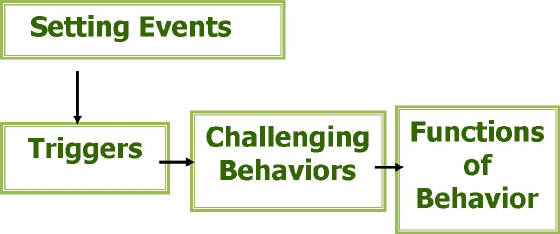|
There always seems to be a reason for behaving one way or
another. Positive behavior support is a research-based approach to increasing quality of life and decreasing problem behaviors. Challenging
behaviors tend to be reduced when individuals are offered the appropriate support for achieving their desired goals
or coping with stressful events. A functional analysis of behavior is the foundation of positive behavior support. It identifies
the setting events, triggers, challenging behaviors and functions of behavior.
|
|

Setting
events are individual characteristics that can influence behavior such as seizure disorder or medical conditions,
sensory sensitivities, processing difficulties, caregiver changes, or depression or anxiety.
Triggers
are specific incidents that predictably precede behavior such as crowds, loud noises, lack of choice, and feeling sad,
angry or embarrassed.
Challenging behaviors are behaviors
that may interfere with an individual's ability to learn, make friends, be safe, or particpate in meaningful activities.
The
function of a behavior is the reason behind the behavior. It is what a person gets or avoids as a result
of the behavior. Although the behavior itself may be maladaptive, the function of a behavior may not be negative. Common functions
of behavior include avoiding an uncomfortable situation, relieving stress or anxiety, or seeking connection with others.
Once the above are identified, there are a variety of techniques that may be used to modify a dangerous
or undesirable behavior. Techniques may include support for safe alternatives and skill building, modification
of the environment and personal supports to predict positive behavior as well as methods to decrease risk of crisis level
behaviors.
|

